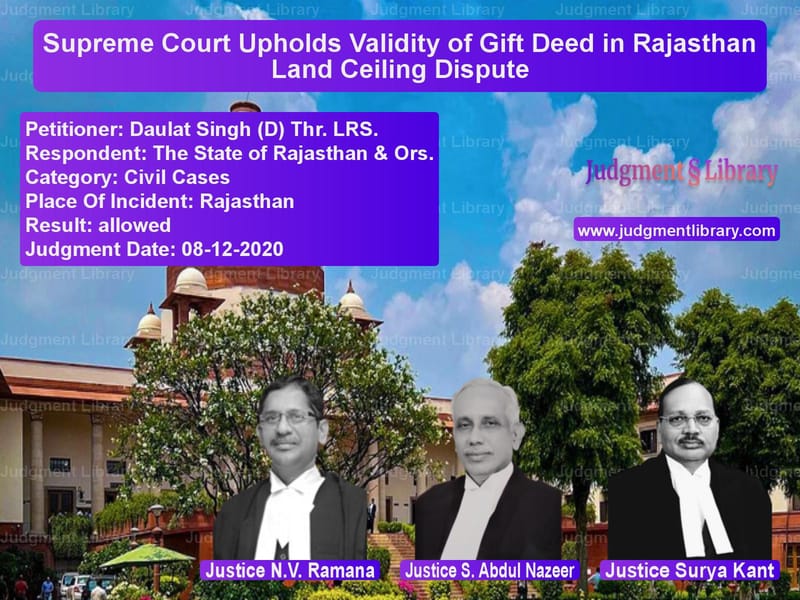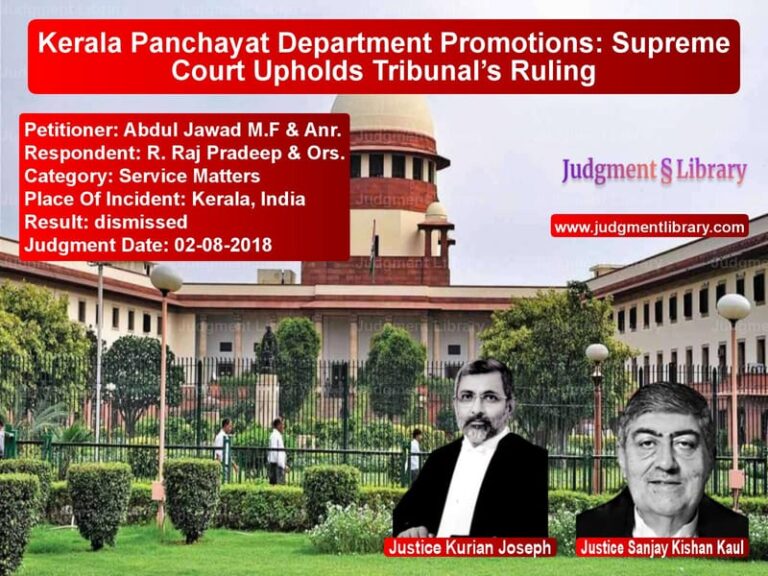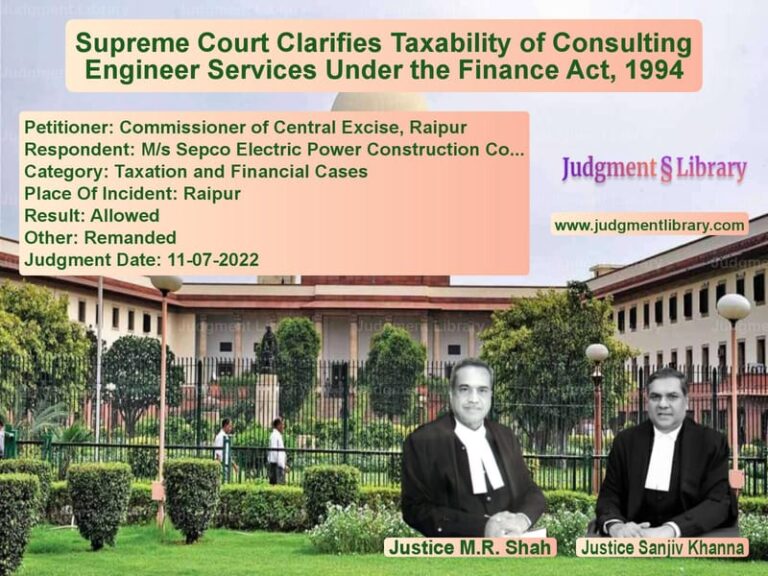Supreme Court Upholds Validity of Gift Deed in Rajasthan Land Ceiling Dispute
The Supreme Court of India delivered a landmark judgment in the case of Daulat Singh (D) Thr. LRS. vs. The State of Rajasthan & Ors., which revolved around the validity of a gift deed executed before the introduction of land ceiling laws in Rajasthan. The case raised significant questions regarding the retrospective application of land ceiling laws, the legality of pre-existing transfers, and the limits of state intervention in private property matters.
Background of the Case
The dispute originated from a registered gift deed executed in 1963 by Daulat Singh, transferring approximately 127.1 Bighas of agricultural land to his son, Narpat Singh. The land transfer was initially accepted by the authorities, and the land ceiling case was closed in 1975. However, in 1982, the Rajasthan Revenue Ceiling Department reopened the case, questioning the validity of the gift deed and alleging that the transfer was intended to evade land ceiling laws.
Legal Issues
- Was the reopening of the case after nearly two decades justified under the land ceiling law?
- Could a legally executed gift deed be invalidated retrospectively under the Rajasthan Imposition of Ceiling on Agricultural Holdings Act, 1973?
- Did the transfer violate Sections 30C and 30D of the Rajasthan Tenancy Act, 1955?
Arguments Presented
Petitioner’s Arguments
Daulat Singh’s legal representatives argued:
- The gift deed was legally executed in 1963, long before the imposition of land ceiling laws in Rajasthan.
- The Rajasthan Tenancy Act, 1955, as amended, did not apply to transfers executed before 1969.
- The revenue authorities had earlier deemed the transfer valid and closed the land ceiling case in 1975.
- The reopening of the case in 1982 was beyond the prescribed limitation period.
- The donee had been in possession of the land for over 20 years, reinforcing the legitimacy of the transfer.
Respondent’s Arguments
The State of Rajasthan, representing the Revenue Ceiling Department, countered:
- The Rajasthan Imposition of Ceiling on Agricultural Holdings Act, 1973, empowered the government to re-examine transfers made before its enactment if they were intended to circumvent land ceiling laws.
- The Board of Revenue correctly reopened the case, as the transfer reduced the declared land holding below the prescribed ceiling limit.
- The High Court was correct in ruling that the donee was unaware of the transfer at the time of execution, rendering the gift invalid.
- The state had the right to redistribute excess land to landless farmers under the land ceiling policy.
Supreme Court’s Observations
The Supreme Court, in its judgment delivered by Justices N.V. Ramana, S. Abdul Nazeer, and Surya Kant, made several key observations:
1. Reopening of Ceiling Proceedings
The Court analyzed Section 15 of the Rajasthan Ceiling Act, 1973, which allows reopening of cases if land transfers contravened legal provisions. The Court found that the reopening in 1982 was within the permissible timeframe under exceptional circumstances but emphasized that mere reopening does not automatically invalidate a transaction.
2. Validity of the Gift Deed
The Court examined Sections 122 and 123 of the Transfer of Property Act, 1882, which govern the execution of gift deeds, and held:
- The gift deed was a registered document, attested by witnesses, and met all legal requirements.
- Acceptance by the donee was implicit, as he had been cultivating the land for years.
- There was no legal necessity for written acceptance; implied possession and usage were sufficient proof.
3. Compliance with Rajasthan Tenancy Act
The Court examined Sections 30C and 30D of the Rajasthan Tenancy Act, 1955, which restrict land transfers exceeding the ceiling limit. However, it also considered Section 30DD, which provides an exception for bona fide transfers made before 1969. Since the gift deed was executed in 1963, the Court held that it was protected under this provision.
4. Application of Land Ceiling Laws
The Court reaffirmed that the Rajasthan Ceiling Act, 1973, applies prospectively and cannot be used to invalidate transfers made before its enactment unless fraud or misrepresentation is established.
Final Judgment
- The Supreme Court set aside the High Court’s order and upheld the validity of the gift deed.
- The land transfer was deemed legal and not subject to resumption under land ceiling laws.
- The appeal was allowed in favor of the appellant.
Implications of the Judgment
This ruling has significant implications:
- Reaffirms the validity of pre-existing land transfers against retrospective land ceiling policies.
- Clarifies that legally executed gift deeds cannot be invalidated based on subsequent legislative changes.
- Protects property rights and prevents arbitrary state intervention.
- Sets a precedent for similar land ceiling disputes across India.
The Supreme Court’s judgment reinforces the principle that legally executed transactions should not be interfered with retrospectively unless clear evidence of fraud or misrepresentation is present.
Petitioner Name: Daulat Singh (D) Thr. LRS..Respondent Name: The State of Rajasthan & Ors..Judgment By: Justice N.V. Ramana, Justice S. Abdul Nazeer, Justice Surya Kant.Place Of Incident: Rajasthan.Judgment Date: 08-12-2020.
Don’t miss out on the full details! Download the complete judgment in PDF format below and gain valuable insights instantly!
Download Judgment: Daulat Singh (D) Thr vs The State of Rajasth Supreme Court of India Judgment Dated 08-12-2020.pdf
Direct Downlaod Judgment: Direct downlaod this Judgment
See all petitions in Property Disputes
See all petitions in Succession and Wills
See all petitions in Landlord-Tenant Disputes
See all petitions in Damages and Compensation
See all petitions in Judgment by N.V. Ramana
See all petitions in Judgment by S. Abdul Nazeer
See all petitions in Judgment by Surya Kant
See all petitions in allowed
See all petitions in supreme court of India judgments December 2020
See all petitions in 2020 judgments
See all posts in Civil Cases Category
See all allowed petitions in Civil Cases Category
See all Dismissed petitions in Civil Cases Category
See all partially allowed petitions in Civil Cases Category







